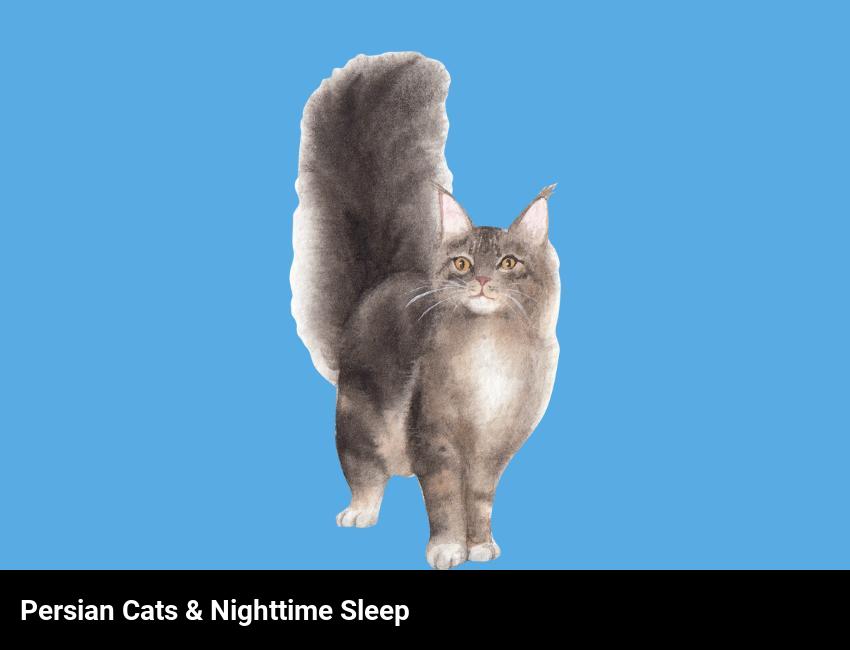Do Persian Cats Sleep At Night?
Yes, Persian cats usually sleep at night. They are active during the day and tend to be more active in the evening hours.
As a proud owner of a Persian cat, I’m often asked if Persian cats sleep at night. After years of experience with my own cat, I can confidently say that yes, Persian cats do sleep at night. Of course, they have their own unique sleeping habits and needs that must be taken into consideration.
In this blog post, I’ll share all the information I’ve gathered about Persian cats and their sleeping patterns. I’ll answer questions about if Persian cats are nocturnal, what environment they prefer for sleeping, if they have specific sleeping schedules, and more. I’ll even provide tips on how to make sure your Persian cat gets enough rest and what signs to look for to tell if your cat is sleeping.
What are the sleeping habits of persian cats?
Do you ever wonder what Persian cats do in the middle of the night? It turns out that Persian cats have their own unique routines when it comes to getting their beauty sleep.
Persian cats are known to be nocturnal creatures, meaning they prefer to be active during the night. This means they can often be seen napping during the day, and doing their most active playing and exploring during the night.
When it comes to sleeping, Persian cats can be found snuggled up in their favorite spots. Persian cats are known for their love of comfort, so it’s no surprise that they usually choose the coziest places to catch some Z’s. Whether it’s a sunny windowsill, a soft cushion, or a warm lap, Persian cats are sure to find the comfiest spot for a good night’s sleep.
However, it’s important to remember that Persian cats can be just as active during the night as they are during the day. If you’re a light sleeper, it’s important to keep an eye out for any late-night antics that your Persian cat may be up to.
All in all, Persian cats have their own unique sleeping habits. They may be nocturnal creatures, but that doesn’t mean they don’t need their beauty sleep. With all the late-night adventures they take, it’s important to give your Persian cat the rest they need so they can keep on being the lovable cats we all love.
Are persian cats nocturnal?
No, Persian cats are not nocturnal. They are crepuscular, meaning they are most active at dawn and dusk. This is typical of cats, who were originally nocturnal hunters. However, like all cats, Persian cats can be active at any time of the day or night.
Most cats, including Persian cats, will sleep during the day and be active late in the evening and even in the middle of the night. But don’t be surprised if your Persian cat is more active during the day than at night. Some cats, especially those that live indoors, may adjust their sleep schedule to fit their human’s preferences.
If you’re a night owl and you’re looking for a pet that’s just as active and awake as you, a Persian cat could be a great companion. Persian cats are still active and playful even at night, and they can provide many hours of entertainment. Just make sure you give them time to rest during the day so they don’t get too exhausted.
Persian cats can make wonderful companions, no matter the time of day. They’re loving, affectionate, and loyal, and they can make great additions to any home. And who knows, maybe your Persian cat will even help you stay up late and keep you company through the night.
What environment do persian cats prefer for sleeping?
If you’re a Persian cat owner, you already know that your fluffy feline loves to snuggle up and get cozy when it’s time for a nap. But where exactly do they prefer to sleep? Persian cats tend to prefer a warm and cozy environment when it comes to settling in for the night.
A Persian cat’s ideal sleeping spot is somewhere it can feel safe and secure. This could be in a cozy corner of the bedroom or even on the couch in your living room. If you have a spare blanket or pillow, your kitty will be thrilled to make it their own. A Persian cat also likes to have some elevated places around the home to sleep on, such as a cat tree or window seat.
Additionally, Persian cats love to be around their humans when it’s time to sleep. If you have a spot on your bed that’s just for your furry friend, that can be the perfect place for them to curl up and get comfy. You can also check out pet beds with sides and cushions that will give your fluffy pal a safe and cozy spot to call their own.
Regardless of where your Persian cat chooses to sleep, it’s important to make sure they have plenty of soft bedding and a comfortable spot to curl up in. This will ensure they have a good night’s sleep and be ready to tackle the day when it’s time to get up.
Are persian cats usually active during the night?
Absolutely! Persian cats are usually active during the night. A typical Persian cat will sleep most of the day and then wake up at night to be active. It’s no wonder they are sometimes called “night cats”.
It’s important to provide your Persian cat with plenty of toys to keep them entertained while they are awake at night. Catnip toys, laser pointers, and scratching posts are great options to keep them occupied. If you have another pet in your home, you may also want to give them interactive toys to play with together.
Your Persian cat may also prefer to take part in some nighttime activities like playing games, chasing toys, and jumping around. As long as you’re not getting up in the middle of the night to keep them entertained, you should be able to get a good night’s sleep.
In addition to keeping your Persian cat active at night, it’s also important to make sure they get plenty of rest during the day. Make sure to give them a quiet and comfortable place to sleep and keep the noise to a minimum.
Overall, if you own a Persian cat, you can expect them to be active at night. With the right toys and a comfortable sleeping space, you can both get the rest you need.
Do persian cats have specific sleeping schedules?
Yes, Persian cats do have specific sleeping schedules. They tend to sleep during the day, and are most active during the night. This is why Persian cats are known to be “night owls”.
Persian cats sleep a lot, typically up to 16 hours a day. They tend to sleep in short bursts of about an hour or two throughout the day and night. Whenever they’re not napping, they’re usually quite active so you might find them playing or exploring around the house.
Persian cats are crepuscular, meaning they are most active during dawn and dusk. If you want to bond with your Persian, this is the best time to do so. During the day they’ll be sleeping and at night they’ll be busy. So if you want to give your Persian some quality time, spend it with them during dawn and dusk.
Persian cats may also adjust their sleeping schedule according to your own. They’ll naturally sleep throughout the day when you’re busy and be active when you’re home. They often sleep in the same room as their owners, and may even try to sleep in the same bed.
So, to answer your question – yes, Persian cats do have specific sleeping schedules. They tend to sleep during the day, and are most active during the night.
What signs can you look for to tell if your persian cat is sleeping?
When it comes to sleeping, Persian cats give off plenty of signs that they are taking a snooze. If you’re curious about whether your Persian cat is sleeping, here are some signs to look for:
First, take a peek at your cat’s eyes – if they are closed and the pupils don’t seem to be moving, that’s a good sign that your cat is fast asleep. If your kitty is in one spot for an extended period of time, that’s another indication that your Persian cat is catching some much-needed rest.
Second, pay attention to your cat’s body language. A sleeping Persian cat will usually keep their head tucked between their paws, or they might curl up in a ball of fur. They may also be lying in a position that looks like they’re ready to pounce or their legs might be tucked under their body – this is a sign that your cat is in deep sleep.
Finally, if your Persian cat is snoring, purring, or making soft meows – that’s a definite sign that they are dozing off. Persian cats also tend to twitch their paws while they sleep as if they are dreaming – this is perfectly normal.
So if your Persian cat is displaying any of these signs, it’s safe to say that they are taking a well-deserved nap.
Are there any special techniques you can use to make your persian cat feel comfortable and relaxed when sleeping?
Yes! There are a few things you can do to make sure your Persian cat feels comfortable and relaxed when sleeping.
First, make sure your cat has a comfortable place to sleep. A soft, cushioned bed or mattress is ideal for a Persian cat. Also, look for a bed that is big enough for your cat to stretch out and relax in. If your cat tends to curl up in a ball, a smaller bed should do the trick.
Second, be sure to keep your Persian cat’s sleeping area quiet and dark. Cats have a natural instinct to hide in dark, quiet places, so keeping the area free of noise and bright lights will help your cat feel relaxed. If you have a lot of foot traffic in your home, consider moving your cat’s sleeping area to a quieter part of the house.
Finally, make sure the temperature of the sleeping area is comfortable for your cat. Cats tend to like warmer temperatures, and your Persian cat should be no different. Make sure to keep the room warm enough for your cat to curl up in.
By following these tips, you can ensure that your Persian cat will be comfortable and relaxed when sleeping.
What kind of special care do persian cats need to ensure they get enough sleep?
Persian cats need special care to make sure they get enough restful sleep. To start, they need a quiet and comfortable sleeping space, such as a dedicated cat bed or spot on a couch. Make sure it’s in a room without loud noises or too many distractions. Persian cats also do best in a temperature-controlled environment, so make sure their sleeping space isn’t too hot or too cold.
These cats also need plenty of stimulation throughout the day. Offer them interactive toys and activities so they’ll be ready for a good night’s sleep. Consider bringing in a scratching post or cat condo to occupy their time while they’re awake. Make sure they have access to plenty of fresh, clean water and a nutritious diet.
Finally, don’t forget to give your Persian cat plenty of attention. They love spending time with their humans and feel more secure when they’re around. They’ll be far more likely to sleep soundly when they know you’re nearby. Brush them regularly to keep their fur in tiptop shape and check regularly for any signs of illness or injury.
By following these tips, you’ll be ensuring that your Persian cat gets the sleep they need to stay healthy and happy. With a little extra care and attention, you can help your furry friend get the restful sleep they deserve.

Frequently Asked Questions
Is it normal for persian cats to sleep at night?
Yes, it is normal for Persian cats to sleep at night. They usually sleep for 12-16 hours per day, usually in short naps throughout the day and night. Persian cats tend to be most active in the morning and evening hours, so they will likely sleep more during the day and less during the night.
What can i do to help my persian cat get a good night’s sleep?
In order to help your Persian cat get a good night’s sleep, you can create a comfortable, quiet sleeping area for them in a low-traffic area of your home. Make sure they have a soft blanket or bed, and provide them with toys and treats to keep them entertained during the day. Establish a consistent sleeping schedule by setting a specific time for lights out, and try to stick to it as much as possible. If your cat is still having trouble sleeping, consult your vet for further advice.
What are the potential risks of my persian cat not getting enough sleep?
Without proper rest and sleep, your Persian cat may be at risk of experiencing various health issues, including a weakened immune system, an increased risk of obesity, and behavioral issues like irritability and aggression. Additionally, sleep deprivation can lead to decreased cognitive functioning and negative effects on overall quality of life.
How can i tell if my persian cat’s sleep pattern is disrupted?
If your Persian cat’s sleep pattern is disrupted, you may notice changes in their behavior. Look out for signs such as increased restlessness, lack of energy, vocalizing more often than usual, and sleeping during the day instead of night. Additionally, watch for changes in their appetite and activity level. If you notice any of these things, consult your veterinarian to discuss possible sleep-related issues.
Is there any benefit to having my persian cat sleep at night?
Yes! Having your Persian cat sleep at night may provide several benefits. It can help keep your cat healthy by ensuring they’re getting enough rest, and it can also keep them from being disruptive during the night. Additionally, you’ll have more time to spend with your pet during the day.







